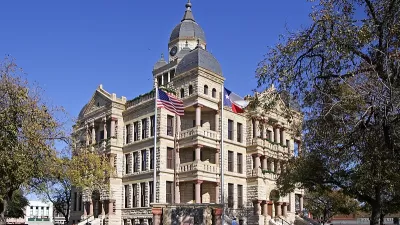Kirk Victor examines the new and risky roads many cities are taking to get immediate access to capital in order to finance their fiscal challenges.
Local government officials, facing once-in-a-generation challenges of "persistently high unemployment, soaring pension and health-care costs, dwindling property values that have robbed cities of revenues, and cutbacks in federal and state assistance," are increasingly making deals for immediate access to capital from "investment bankers who come to the table armed with an array of exotic-and often difficult-to-understand-financing tools," writes Victor.
As the mortgage-back security and subprime lending markets that helped precipitate the Great Recession demonstrate, there is an danger in utilizing new and sophisticated financial instruments without a full understanding of their risks.
"Even when the cutting-edge deal stems from a genuine try at solving long-term fiscal issues, experts in municipal restructuring say they worry that city leaders don't have the knowledge base to analyze the deals sufficiently. The lack of sophisticated investment analytical abilities puts them and their cities at risk of making ill-informed decisions or even of being taken to the cleaners."
Not every deal is a bad deal, as residents of Chicago and Indianapolis can attest, but there are inherent dangers of turning to short-term fixes in exchange for long-term concessions.
As Victor asserts, "The lesson in all of this is that there are no magic financing techniques."
FULL STORY: Struggling Cities Strike Deals to Solve Fiscal Problems

Planetizen Federal Action Tracker
A weekly monitor of how Trump’s orders and actions are impacting planners and planning in America.

Restaurant Patios Were a Pandemic Win — Why Were They so Hard to Keep?
Social distancing requirements and changes in travel patterns prompted cities to pilot new uses for street and sidewalk space. Then it got complicated.

Map: Where Senate Republicans Want to Sell Your Public Lands
For public land advocates, the Senate Republicans’ proposal to sell millions of acres of public land in the West is “the biggest fight of their careers.”

Maui's Vacation Rental Debate Turns Ugly
Verbal attacks, misinformation campaigns and fistfights plague a high-stakes debate to convert thousands of vacation rentals into long-term housing.

San Francisco Suspends Traffic Calming Amidst Record Deaths
Citing “a challenging fiscal landscape,” the city will cease the program on the heels of 42 traffic deaths, including 24 pedestrians.

California Homeless Arrests, Citations Spike After Ruling
An investigation reveals that anti-homeless actions increased up to 500% after Grants Pass v. Johnson — even in cities claiming no policy change.
Urban Design for Planners 1: Software Tools
This six-course series explores essential urban design concepts using open source software and equips planners with the tools they need to participate fully in the urban design process.
Planning for Universal Design
Learn the tools for implementing Universal Design in planning regulations.
Heyer Gruel & Associates PA
JM Goldson LLC
Custer County Colorado
City of Camden Redevelopment Agency
City of Astoria
Transportation Research & Education Center (TREC) at Portland State University
Camden Redevelopment Agency
City of Claremont
Municipality of Princeton (NJ)





























